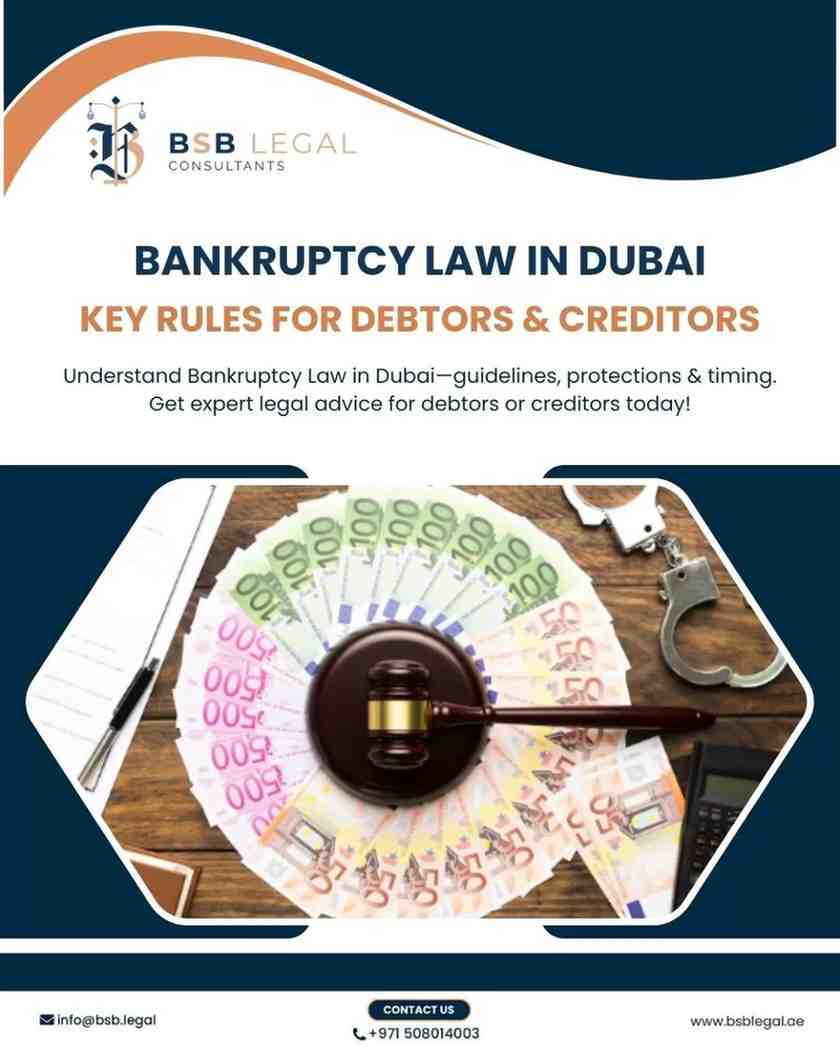
In the business environment of Dubai, financial stability is key. But what happens when things go south? For businesses facing insolvency or creditors pursuing unpaid debts, understanding bankruptcy law in Dubai is important. This blog breaks down the essentials for you!
What is Bankruptcy Law in Dubai?
UAE’s broader federal legal system [Federal Decree-Law No. (51) of 2023 Promulgating the Financial and Bankruptcy Law], is designed to manage insolvency situations in a structured way. Knowing how this law works can help protect your interests, whether you’re a business owner or a creditor.
Key Legal Terms to Know
Debtor: The individual or company that owes money.
Creditor: The entity or individual to whom money is owed.
Preventive Settlement: A legal procedure aimed at helping debtors avoid bankruptcy by reaching an agreement with creditors.
Bankruptcy Proceedings: Legal processes initiated when a debtor is unable to meet financial obligations.
Trustee: A person or entity appointed by the court to oversee the debtor’s assets and the bankruptcy process.
What Debtors Need to Know
For a debtor, filing for bankruptcy is often the last resort. Under Bankruptcy Law in Dubai, a debtor must submit their application to the Bankruptcy Department within 60 days from the date they realize they can no longer pay their debts. This is a critical period, as missing this deadline can complicate the process, though it doesn’t automatically invalidate the application.
Once the application is submitted, the debtor’s ability to dispose of assets is frozen. Any attempt to sell or transfer property after filing can be nullified, ensuring the assets are preserved for potential liquidation or settlement.
Key Takeaways for Debtors:
Timing is Everything: Submit your application within 60 days of financial instability.
Asset Management: Post-filing, you can’t dispose of assets without court approval.
Preventive Measures: Consider preventive settlement as an alternative to full bankruptcy.
What Creditors Should Expect
Creditors, on the other hand, have the right to file for bankruptcy against a debtor if they fail to repay debts. However, the debt must be undisputed, unconditional, and due for payment. Creditors must first notify the debtor and give them 30 days to settle before taking legal action.
If multiple creditors are involved, their applications can be combined into a single proceeding. Importantly, if the debtor’s assets are insufficient to cover all debts, the law ensures that secured creditors—those with collateral—have priority over unsecured creditors.
Key Takeaways for Creditors:
Notice Period: Give the debtor 30 days to repay before initiating bankruptcy proceedings.
Secured vs. Unsecured: Secured creditors have priority in repayment.
Combined Applications: Multiple creditors’ claims can be consolidated.
Role of the Bankruptcy Court
The Bankruptcy Court plays a pivotal role in overseeing the entire process. It evaluates the debtor’s financial position, appoints a trustee if necessary. And ensures that all proceedings are carried out fairly and following the law. The court also sets the “cessation of payment date,” which is critical in determining the timeline for legal actions and claims.
Special Cases
The law also covers specific scenarios, such as when the debtor is a company or has passed away. In the case of a company, bankruptcy proceedings can be initiated even if the company is in liquidation or has been dissolved. For deceased or incapacitated individuals, their legal representatives or heirs can file for bankruptcy on their behalf within two years of death or incapacitation.
Precautionary Measures
During bankruptcy proceedings, the court may decide to take precautionary measures, like freezing assets or suspending other legal actions against the debtor. This is done to protect the interests of creditors and ensure that the debtor’s remaining assets are used in the most equitable way possible.
Conclusion
Navigating financial distress requires more than just business instinct—it demands sound legal insight. Whether you’re a debtor aiming to protect your assets or a creditor seeking fair recovery, understanding the nuances of bankruptcy law in Dubai is vital. This comprehensive legal framework not only promotes equitable financial resolution but also safeguards the interests of all parties involved. Whether you’re a debtor seeking to protect your assets or a creditor looking to recover your funds, the right legal guidance is crucial. Need expert advice? Consulting with a top legal consultant in Dubai or a Dubai Lawyer can provide you with the tailored guidance you need.







